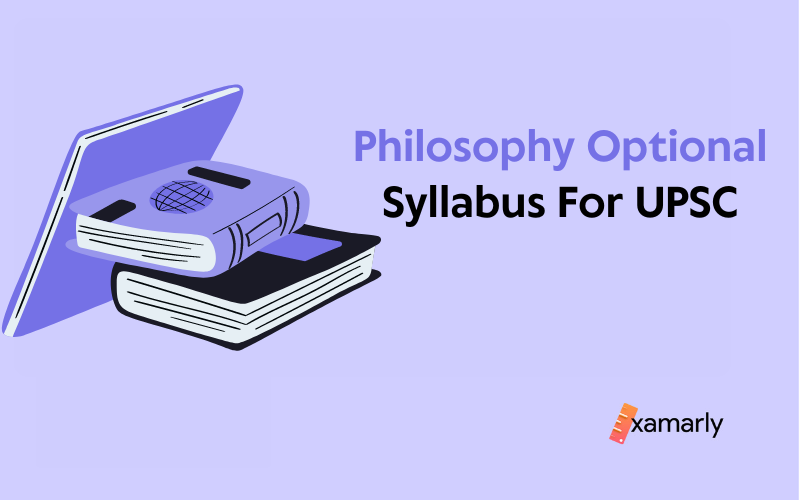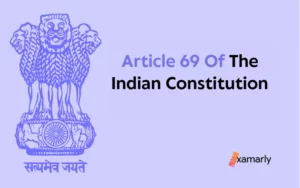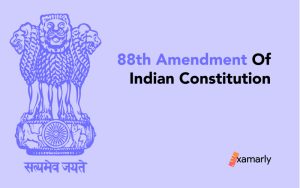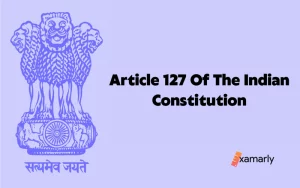The official UPSC notice contains a complete outline of the philosophy syllabus. The Philosophy Optional Syllabus for UPSC is one of the 48 disciplines that candidates may choose from for the optional paper in the UPSC Mains.
The UPSC Philosophy Optional Syllabus for the IAS Exam gauges the applicants’ competence in the subject’s elements and practical uses. History, social and political philosophy, religious philosophy, social structures, and other topics with practical implications are covered in this subject.
- Philosophy Optional Syllabus For UPSC
- Exam Pattern Of Philosophy Optional For UPSC
- Preparation Tips
- Best Books For UPSC Philosophy Optional Syllabus
- Questions Of Previous Papers Of UPSC
- Conclusion
- FAQs
- Is Philosophy A Good Optional For UPSC?
- Compared To Other Optional Topics, Is The UPSC Philosophy Syllabus shorter?
- Can Anyone Study Both The UPSC Prelims Curriculum And The UPSC Philosophy Syllabus At The Same Time?
- What Are The Intersection Points Between The Philosophy Optional Syllabus For UPSC And The UPSC Mains Syllabus?
- Who Can Opt For The Philosophy Paper For UPSC?
Philosophy Optional Syllabus For UPSC
The nature of the entire syllabus for the optional subject philosophy in the UPSC Exam is static. This implies that it does not partially or wholly rely on current affairs and hence it remains constant.
Numerous philosophical topics can be applied to other fields, such as ethics and writing essay papers. Certain philosophical notions can also be applied to other general studies papers.
UPSC Philosophy Optional Syllabus Of Paper I
History And Problems Of Philosophy:
- Plato and Aristotle: Ideas; Substance; Form and Matter; Causation; Actuality and Potentiality.
- Rationalism (Descartes, Spinoza, Leibniz): Cartesian Method and Certain Knowledge; Substance; God; Mind-Body Dualism; Determinism and Freedom.
- Empiricism (Locke, Berkeley, Hume): Theory of Knowledge; Substance and Qualities; Self and God; Scepticism.
- Kant: Possibility of Synthetic a priori Judgments; Space and Time; Categories; Ideas of Reason; Antinomies; Critique of Proofs for the Existence of God
- Hegel: Dialectical Method; Absolute Idealism
- Moore, Russell and Early Wittgenstein: Defence of Commonsense; Refutation of Idealism; Logical Atomism; Logical Constructions; Incomplete Symbols; Picture Theory of Meaning; Saying and Showing.
- Logical Positivism: Verification Theory of Meaning; Rejection of Metaphysics; Linguistic Theory of Necessary Propositions.
- Later Wittgenstein: Meaning and Use; Language-games; Critique of Private Language.
- Phenomenology (Husserl): Method; Theory of Essences; Avoidance of Psychologism.
- Existentialism (Kierkegaard, Sartre, Heidegger): Existence and Essence; Choice, Responsibility and Authentic Existence; Being-in-the –world and Temporality.
- Quine and Strawson: Critique of Empiricism; Theory of Basic Particulars and Persons.
- Carvaka: Theory of Knowledge; Rejection of Transcendent Entities.
- Jainism: Theory of Reality; Saptabhanginaya; Bondage and Liberation.
- Schools of Buddhism: Prat Ityasamutpada; Ksanikavada, Nairatmyavada.
- Nyaya- Vaiesesika: Theory of Categories; Theory of Appearance; Theory of Pramana; Self, Liberation; God; Proofs for the Existence of God; Theory of Causation; Atomistic Theory of Creation.
- Samkhya: Prakrti; Purusa; Causation; Liberation
- Yoga: Citta; Cittavrtti; Klesas; Samadhi; Kaivalya.
- Mimamsa: Theory of Knowledge
- Schools of Vedanta: Brahman; Isvara; Atman; Jiva; Jagat; Maya; Avida; Adhyasa; Moksa; Aprthaksiddhi; Pancavidhabheda.
- Aurobindo: Evolution, Involution; Integral Yoga.
UPSC Philosophy Optional Syllabus Of Paper II
Socio-Political Philosophy:
- Social and Political Ideals: Equality, Justice, Liberty.
- Sovereignty: Austin, Bodin, Laski, Kautilya.
- Individual and State: Rights; Duties and Accountability
- Forms of Government: Monarchy; Theocracy and Democracy.
- Political Ideologies: Anarchism; Marxism and Socialism
- Humanism; Secularism; Multiculturalism.
- Crime and Punishment: Corruption, Mass Violence, Genocide, Capital Punishment.
- Development and Social Progress.
- Gender Discrimination: Female Foeticide, Land and Property Rights; Empowerment.
- Caste Discrimination: Gandhi and Ambedkar
Philosophy Of Religion:
- Notions of God: Attributes; Relation to Man and the World. (Indian and Western).
- Proofs for the Existence of God and their Critique (Indian and Western).
- Problem of Evil.
- Soul: Immortality; Rebirth and Liberation.
- Reason, Revelation and Faith.
- Religious Experience: Nature and Object (Indian and Western).
- Religion without God.
- Religion and Morality.
- Religious Pluralism and the Problem of Absolute Truth.
- Nature of Religious Language: Analogical and Symbolic; Cognitivist and Non-cognitive.
Exam Pattern Of Philosophy Optional For UPSC
There will be two optional papers worth 250 each in the UPSC Mains exam covering the topics covered under the UPSC Philosophy Syllabus. These Subjective papers will have questions of a descriptive nature.
People who are well-versed in the subject or who studied philosophy in college choose it as an optional subject. As the paper is of 500 marks, prepare it wisely.
The time duration to write the answers in your answer copies is 3 hours. This also implies that practice answer writing beforehand so that you will take lesser time in structuring the answer or in thinking about the outline.
For the entire UPSC Exam Pattern, check out the linked article.
Preparation Tips
The four components of the UPSC philosophy syllabus are:
- Indian Philosophy,
- Western Philosophy,
- Social-Political Philosophy,
- Religious Philosophy.
For every component, we have a preparatory plan ready to prepare for the IAS Mains exam.
- A Critical History of Western Philosophy written by Yakub Masih and Introduction to Indian Philosophy written by Satish Chandra Chatterjee are two books that can be used to learn about Indian philosophy as well as western philosophy. Both will have two mandatory questions from this topic in Paper 1 of the UPSC Philosophy syllabus.
- The fundamental components of exam 2 are the topics of social-political philosophy and religious philosophy, which candidates can learn about by reading periodicals like Hindu, and monthly magazines.
- In addition to studying the topics, candidates need to practice writing answers. Making notes would aid applicants in their revision.
- Give mock tests, and solve previous years’ question papers to find out how much preparation you’ve done and how much more attention you need to give to the crucial sections.
- Because the UPSC Philosophy Optional Syllabus is so extensive, it’s crucial for applicants to maintain a note of all the key terms, definitions, and timeframes. The candidates will learn more quickly if they use flowcharts and diagrams when taking notes.
Best Books For UPSC Philosophy Optional Syllabus
For reference in preparing for the UPSC Philosophy Syllabus, the following list of books is provided: –
- A History of Philosophy: Frank Thilly
- A Critical History of Western Philosophy: Yakub Masih
- Indian Philosophy II Volume: S. Radhakrishnan
- An Introduction to Political Theory: O P Gauba
- Introduction to Religious Philosophy: Yakub Masih
- Existentialism: A Reconstruction David E. Cooper
- An Introduction to Indian Philosophy: Satishchandra Chatterjee
- Philosophy of Religion – John H Hick
Questions Of Previous Papers Of UPSC
- Explain and evaluate the role of integral yoga in the process of triple transformation for individual evolution as expounded by Sri Aurobindo.
- Explain the Buddhist concept of Trratna and their internal relation. Critically examine the consistency of Trratnas with the Buddhist concept of No-soul (Nairatmyavada).
- Discuss the role of the enlightenment movement in the rise of humanism.
- What is Bertrand Russell’s method of logical analysis? How does it ultimately end in establishing the atomic theory of meaning? Discuss.
- “Complete liberty may lead to inequality while order and restrictions imply a necessary loss of freedom.” Critically discuss.
- Critically examine Quine’s postulate of empiricism without the dogmas with reference to his ‘Two Dogmas of Empiricism’.
Relatable Articles:
- How To Select Optional Subject For UPSC Exam
- Best Optional Subject For UPSC
- Removal of optional subjects in UPSC
- Management Optional Syllabus For UPSC
- Psychology Optional for UPSC
- Psychology Optional UPSC Syllabus
Conclusion
Candidates who select philosophy as an optional subject in the UPSC will discover that the syllabus places a strong emphasis on problems and subjects related to the evolution of philosophy and the history of philosophy as well as its influence on Indian society and culture.
The IAS Mains exam’s philosophy syllabus is centered on candidates’ comprehension of the topic and their capacity to apply their knowledge to the society of India.
The key to success is to prepare for this fundamental subject wisely, by making a firm grip on the concepts, doing a considerable amount of revisions, practicing answer writing beforehand, and thinking out of the box in any situation that comes in front of you.
FAQs
Is Philosophy A Good Optional For UPSC?
Yes, it is a good optional subject for UPSC CSE if you have studied before in your graduation or post-graduation and have a keen interest to study.
Compared To Other Optional Topics, Is The UPSC Philosophy Syllabus shorter?
Compared to the syllabus of other optional subjects, the UPSC philosophy curriculum is narrower. Furthermore, the syllabus is clearly laid out, which is another reason it has gained popularity with hopefuls.
Can Anyone Study Both The UPSC Prelims Curriculum And The UPSC Philosophy Syllabus At The Same Time?
Yes, anyone can study UPSC Prelims in parallel to this subject for the UPSC Mains optional, as it is recommended to follow the integrated approach to complete the syllabus of UPSC in time. However, one should stress over the syllabus of UPSC Prelims when the Prelims exam is approaching.
What Are The Intersection Points Between The Philosophy Optional Syllabus For UPSC And The UPSC Mains Syllabus?
Some portions of the UPSC Philosophy Optional Syllabus are a part of the Ethics Paper (IV) of UPSC IAS Mains.
Who Can Opt For The Philosophy Paper For UPSC?
If you have studied this fundamental subject before in your college, and have a good amount of knowledge in it, then you can opt for this subject in the Civil Services Mains Exam. However, it is not compulsory to have an academic background. As there are many aspirants who cleared this ardent exam with an optional subject of which they have no idea before.






